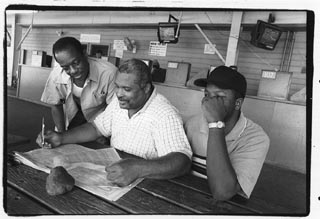Gambling? What Gambling?
Allergic to taxes, the Lege tries to balance the budget with the rolls of the dice.
By Mike Clark-Madison, Fri., May 2, 2003

Who says morality isn't relative? Compared to the hideous mortal sin of a state income tax, widespread legalized gambling throughout Texas looks positively innocent, or at least venial. That's the New Texas for you.
And analysts say the New Texas will be about $1 billion richer -- or, more properly, $1 billion less broke -- if the state adopts the front-running gaming schemes. State Comptroller Carole Keeton Strayhorn has slapped her brand name on two of these plans -- joining a multistate lottery and creating "video lottery" parlors at racetracks -- and folded them into her lists of thrifty hints for Texas House-keepers. (And Senate-keepers, too.)
In an amazing coincidence, Strayhorn informed legislators last week their proposed budgets don't balance to the tune of $2.9 billion. (Lawmakers were shocked, shocked to find there are smoke-and-mirrors going on here.) Strayhorn added that "additional money-saving opportunities -- and new engines of economic growth -- remain on the table and should be adopted." You do the math.
The Lege is actually looking at a couple dozen bills that would in some way expand legal gambling in Texas. (None would restrict it.) Some are minor -- like HB 2543 (Bonnen), which allows charity raffles to give away actual money, though not more than $250. Others, like SB 507 (Ellis) and SB 1894 (Lucio), would create a huge Texas gambling industry in one fell swoop. (These are the bills that would enable a casino on Waller Creek.) Lucio's bill earmarks the state's winnings for higher education, while Ellis proposes no such restrictions. Both bills are sitting in the Senate State Affairs Committee, where they will likely die. Likewise HB 486, Ron Wilson's bill to turn the Astrodome into an Astrocasino, which has gathered dust in House State Affairs for more than two months.
The House Committee on Licensing and Administrative Procedures, on the other hand, has been wrangling a host of gambling bills, many authored by Chair Rep. Kino Flores, D-Mission. (Wilson has another bill, HB 3380 -- legalizing day-trip casino cruises -- sitting on Flores' desk.) Nothing as blatant as SB 507 is going to make it, since Gov. Rick Perry has already made clear his intent to veto any measure that "expands" gambling in Texas. With the exception of HB 486 (Keel), which would allow the Tigua Indians' Speaking Rock casino in El Paso to reopen, nothing that admits to legalizing casino gambling is expected to survive.
So Flores and his committee are discussing middle-way measures -- they generate real money for the state, but they don't obviously look like, you know, gambling. These include several "enhancements" to Texas charity bingo that would make it more casinolike (progressive bingo, satellite pools, and so on). The House also has several bills to legalize (and tax) vaguely defined "amusement redemption machines," i.e., eight-liners. Neither bingo nor eight-liners bring in much money to the state, but they could further fatten the coffers of nonprofits that, in the New Texas, will be doing a lot of the state's work.
Real money, though, could be made by joining a multistate lottery like Powerball or Mega Millions (SB 217, Ellis) -- about $100 million in new revenue by 2005, say Strayhorn and the Legislative Budget Board. Consider that done. Even more money -- $140 million, says the LBB -- would be spawned by Flores' HB 1215, which would allow (but not require) the Lottery Commission to run keno games. But that figure is based on the lottery adding 4,000 new retailers to service keno -- which means (as the bill duly allows) eliminating the current ban on mixing alcohol and the lottery. Even Strayhorn wasn't willing to go there.
Biggest of 'em all is this "video lottery" deal, one of the great euphemisms of the session. What Strayhorn proposes, and what Flores' HB 2439 would enable, are "racinos" -- the state's nine existing horse and dog tracks, including Retama Park and Manor Downs, could be stuffed with slot machines and video poker and could look just like any other casino, except the machines would be owned by the state. (Ten years on, the racing industry in Texas is still a bit anemic.) The LBB's estimate of $630 million in new money next biennium (a little lower than Strayhorn's) presumes that 13,000 machines will be in service by 2005 -- nearly 1,500 at each track. (This bill also lifts the alcohol ban on the lottery.)
But since you can already gamble at racetracks, this isn't "new" gambling, say Strayhorn, Flores, and their fans. To his credit, Perry is not buying it, but he also may have no choice. In another amazing coincidence, the Lottery Commission is itself up for sunset-review this year, and in what appears to be a gesture of surrender to Strayhorn, Perry has said he won't veto a lottery sunset bill even if it contains "enhanced" gambling measures. Flores' video-lottery bill is already captioned as a Lottery Commission sunset bill, though the real one will probably be SB 270 (Jackson), which has already been heard in committee. Though SB 270 contains several measures to address the accumulated scandals of the lottery's 12 glorious years, it doesn't say anything about racinos or keno or Powerball -- yet.
Got something to say on the subject? Send a letter to the editor.








